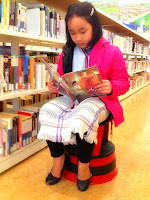Jennifer Kriksciun
Francis Bacon was to have said, “Gardening is the purest of
human pleasures.” I didn’t think this to be true until, as an adult, I had a
garden of my own. Every year I plant vegetables for my daughter to pick and my
animals to eat. My garden beds are small and manageable, yet still they succeed
in exhausting me weekly with a never-ending supply of weeds, all things that
keep me busy most Sunday mornings before the sun gets too hot.
 |
| The Bharatis with seed packets in hand |
I am fortunate that, though I live in a city, I have a small
yard. Living in a city does not always afford one the benefits of a yard let
alone a garden. Hartford residents have access to only a small list of
community gardens around the city, so getting a bed can be difficult. At an Asylum Hill neighborhood welcoming
event, an older couple, the Bharatis, from Nepal expressed an interest in
wanting to garden, but they didn’t know who to talk to nor how to find one. Also, their limited English skills made it difficult for
them to communicate (their son Rup served as a liaison for them.) Connecting with the closest community garden, Knox Gardens
on Laurel Street was even more of a challenge, so I was asked to help them get
a garden plot.
Through talking with the people at Knox, I was happy to learn that many immigrants take advantage of
Hartford community gardens. In fact, in the Asylum Hill neighborhood, it is
common to see Karen, Vietnamese, and Somali residents walking from their garden
plots with an abundance of crops for their own families or to sell or exchange with others. In fact, community gardens can be extremely beneficial
to cities with immigrant communities. Not only can immigrants grow traditional
crops native to their home countries, they can also take advantage of the
cultural exchange between other gardeners. More importantly, gardening allows people from
all backgrounds the opportunity to work side by side on common goals without
speaking the same language. Imagine! Working collaboratively without the constraints of a language barrier!
So with the help of the Bharati’s son Rup and the diligence
of Asylum Hill Neighborhood Association (AHNA) chair Jennifer Cassidy and Knox
Gardens Community Outreach Director Charmaine Craig, the Bharatis received not
one but two garden beds at Knox. When I called Rup for an update on his
parents, he reported that his parents had toured the Knox Gardens with
Charmaine, were given seeds to begin planting, and were extremely happy at the
promise of a wonderful gardening season. A good friend and avid gardener used to repeat a quote to
me, “A garden isn’t meant to be useful. It’s for joy.” Indeed, this is true! I
cannot wait to find out how the Bharati’s garden is doing. I hope it is
bringing them much joy and happiness!



.JPG)




.JPG)